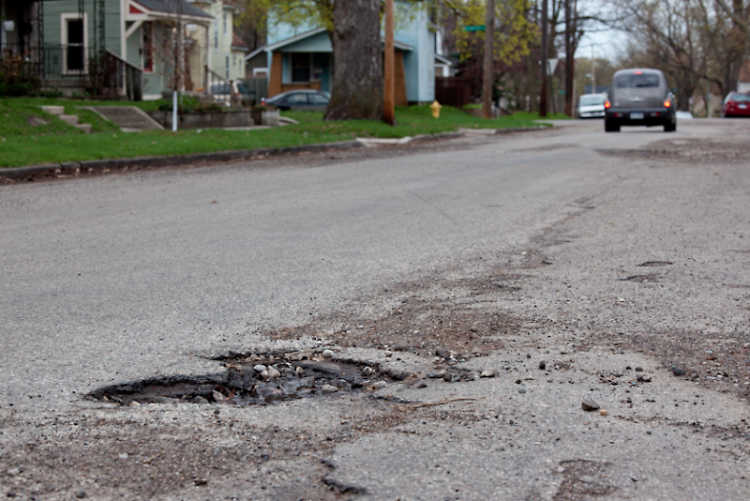Grand Rapids has 586 miles of streets. Our street system is our largest and most visible asset, and a critical component of our local economy. It is nearly impossible to imagine how we would function without our streets, yet that is the choice we face today, May 6, 2014.
We must pass the income tax extension now. The result of a yes vote is that citizens will continue paying exactly the same income tax they currently pay, while the City will be able to begin the 15 year task of rebuilding our streets.
A no vote will add a little money to our pockets now, but will cost us much more later. For example, a $1 million investment can crack seal 389 lane miles of road and preserve those lanes in good condition, or it can reconstruct one lane mile that has fallen into poor condition.
This doesn’t even begin to account for the cost of damaged vehicles, delayed shipments or businesses or citizens who avoid our city because of rutted, pitted streets. A failed street system will drive away residents and discourage business investment.
In early 2012, the Sustainable Streets Task Force, a group comprised of citizens, experts and city staff, began meeting to examine the state of Grand Rapids city streets. At that point, about 60% of city streets were in poor condition; only 8% of our streets were considered to be good.
On July 1, 2013, general fund investment in our streets fell to zero. The City has been facing the economic equivalent of the perfect storm. More efficient vehicles and fewer vehicle miles traveled have resulted in less gas tax revenue. With the economic downturn, income and property taxes have plummeted. State government has steadily reduced the City’s share of sales tax revenue. The resulting budget shortfalls forced the City to eliminate any general fund contributions to street maintenance, and Grand Rapids’ $13 million yearly share of the state gas tax is less that half of what is needed to operate and maintain our streets.
The Sustainable Streets Task Force identified that without further investment, our streets would approach 90% poor by 2019. This would be catastrophic for our community and economy.
To prevent the total collapse of our street system, the Task Force set a goal of rebuilding our street system to a state where 70% of the streets are in good or fair condition. This balances the cost of repairs against what we can reasonably afford to invest. To reach 70% good or fair, it is necessary for us to invest an additional $9 million dollars a year for the next 15 years.
In August, 2013, the Sustainable Streets Task Force presented their final report to the Grand Rapids City Commission. In the report, the Task Force recommended asking the citizens of Grand Rapids to continue the current income tax as the only viable mechanism capable of raising enough money to meet this goal.
The Task Force felt that an important aspect of the income tax is that it applies to citizens who live or work in Grand Rapids. By including those who commute to work in Grand Rapids, we recognize the regional nature of our street system and the importance of Grand Rapids as a regional economic engine.
As a member of the Sustainable Streets Task Force and as a citizen who has intensely studied the causes of, and solutions to, our street maintenance crisis, I strongly urge a YES vote for Grand Rapids streets on May 6.
The potholes this spring are only a taste of what we will experience if we don’t begin investing now.
Disclosure: The author is a member of the Sustainable Streets Task Force.
The Rapidian, a program of the 501(c)3 nonprofit Community Media Center, relies on the community’s support to help cover the cost of training reporters and publishing content.
We need your help.
If each of our readers and content creators who values this community platform help support its creation and maintenance, The Rapidian can continue to educate and facilitate a conversation around issues for years to come.
Please support The Rapidian and make a contribution today.

